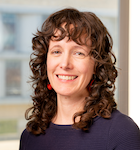Q & A with Ali Groves
Q & A with Ali Groves, PhD, MHS, associate professor of Community Health and Prevention at the Dornsife School of Public Health
March 2021

How did you first become engaged in global health, either through academics or professional experiences?
I first became interested in the global HIV epidemic while studying abroad in Zimbabwe in 1998, where I witnessed firsthand how highly impacted women were by the epidemic.
I first became engaged in global health while on a service fellowship, teaching at an all girls’ high school in Lesotho in 2001 after completing my undergraduate degree. During my tenure, my students and I launched an HIV/AIDS awareness club for the school. After returning from Lesotho, I realized that I wanted to pursue further education in public health!
What current projects are you working on? What are the research goals? What challenges have you faced in carrying these projects out? Who are you partnering with?
I am working on a number of studies to understand and prevent HIV among adolescent mothers.
I am primarily interested in developing and testing intervention that address the social and structural determinants of HIV risk. Recent partners have included Dr Daya Moodley, who is a leading expert in the prevention and treatment of HIV among South African women and their infants during and after pregnancy and Dr. Relebohile Moletane, who is a leading expert in girls’ education and empowerment in South Africa.
Working closely with adolescent mothers, we developed, implemented and piloted an intervention designed to support adolescent mothers’ return to school following childbirth as a means to reduce future HIV risk. Our biggest challenge with this grant was that we had only 2 years to carry out the project! I would love the opportunity further assess the impact of supporting return to school on adolescent mothers’ HIV risk.
I also recently concluded a systematic review on the impact of community-based HIV testing and counseling on HIV prevention and treatment. I conducted this review in close collaboration with a longtime colleague, Petra Stankard, and we were supported substantially in the process by a number of Dornsife students (current: Sarah Bowler; alums: Luwam Gebrekristos and Shedane Shaw). We partnered the World Health Organization to complete this work. Our biggest challenge with this work was that the scope was much larger than we had originally anticipated!
In addition to these studies, I support another global research project of a colleague at the school (Dr. Massey) and also support HIV research on social determinants of health in the United States (Dr. Blankenship) as well as HIV intervention study in the United States to increase postpartum retention in care for HIV+ mothers (Dr. Momplaisir).
What’s the most important thing you’ve learned as a global health professional since the beginning of your career?
I have learned so much and still have to much to learn! The things that first come to mind:
- The work always takes longer than you anticipate it will
- Good partnership building is really critical to your happiness and success
- Despite advances in technology, nothing replaces being ‘on the ground’ to getting things done!
How do you predict the global landscape of high priority public health issues will shift over the next 10 years?
I think that the impact of climate change on global health has become and will continue to be a pressing public health issue. While ‘priority’ health outcomes may shift, I think that the disparities in outcomes will remain with those populations who tend to be the marginalized (recognizing that populations can be socially, economically, politically and/or geographically marginalized.)
What advice can you give to students considering a degree in global health?
Question everything! Ask yourself why you are interested in working in global health. Ask your mentors why they are working in global health. Try to get on-the-ground experience and don’t go in with a ‘savior’ approach. Be ready to land, listen and learn from the experts there – and in particular – the communities affected by the problem you are interested in addressing.